This is an archived article that was published on sltrib.com in 2013, and information in the article may be outdated. It is provided only for personal research purposes and may not be reprinted.
Washington • Congressional Republicans on Tuesday pushed legislation to exempt their states — including Utah — from the president's power to unilaterally designate national monuments.
A month after President Barack Obama named five new national monuments — and on the 105th anniversary of the designation of Utah's first national monument, Natural Bridges — critics of the Antiquities Act assailed the law as a way to circumvent locals who are most affected by the action.
"This process has not worked," said Rep. Rob Bishop, R-Utah. "It has been abused."
Bishop led a Natural Resources subcommittee hearing Tuesday on a series of bills — three of them from Utah lawmakers —- that would prevent a president from using the Antiquities Act to name monuments in certain states without Congress' consent or adding other restrictions to the power.
The hearing comes amid Bishop's push to bring environmentalists, oil and gas officials, local leaders and other groups to the table to negotiate compromise legislation to divvy up land in Utah for protection or development. There was no mention of such compromise in Tuesday's hearing.
An Idaho member wanted to protect the Gem State; Montana's representative sought an exemption for his state; Nevada wanted in on the deal, too.
"There has got to be a better way of doing this," said freshman Rep. Chris Stewart, a Utah Republican whose bill would spare the state from the presidential power.
Alaska and Wyoming pushed restrictions for their respective states into the law decades ago after presidents used the act to name monuments. Other Western states now want to be able to slip through the same loophole. And there are other attempts to ax the president's power, too.
In a separate bill, Bishop would require any future monument to undergo rigorous environmental study.
Rep. Jason Chaffetz, R-Utah, has legislation to make any White House designation of a monument subject to approval by Congress.
"What we're arguing for," Chaffetz said, "is public participation, public input, a public debate."
Utah officials, including two witnesses who testified, cited then-President Bill Clinton's use of the Antiquities Act to create the Grand Staircase-Escalante National Monument in southern Utah in 1996 as an example of the law's overreach.
"We've lived in actual fear of this raw executive power ever since President Clinton and Vice President [Al] Gore, in a cowardly, infamous act, failed to engage the people of Utah in a public process," said Carbon County Commissioner John Jones.
While the Grand Staircase monument still stings for many Utahns, the Antiquities Act has been used to preserve some of the state's most iconic landscapes.
Presidents used the act to designate Zion, Arches, Capitol Reef and Bryce Canyon as monuments before they were named national parks.
Mark Austin, a general contractor in Escalante just outside Grand Staircase, said he believes the community has adapted well to the monument and now has a sustainable economy.
Austin, who was at Tuesday's hearing, says the Antiquities Act has become the fallback to preserving valuable areas when Congress fails to take action.
"At times, it's the only viable option to bypass the quagmire," Austin said. "In an ideal world, we'd all sit down and have rational discussion but, unfortunately, Congress is unable to do that."
The Southern Utah Wilderness Alliance is urging Obama to use the Antiquities Act to protect the area around Canyonlands National Park. Former Interior Secretary Bruce Babbitt said earlier this year that the president must use his authority to protect key areas.
The Natural Resources Committee did not vote on any of the legislation Tuesday but is expected to take it up soon.





